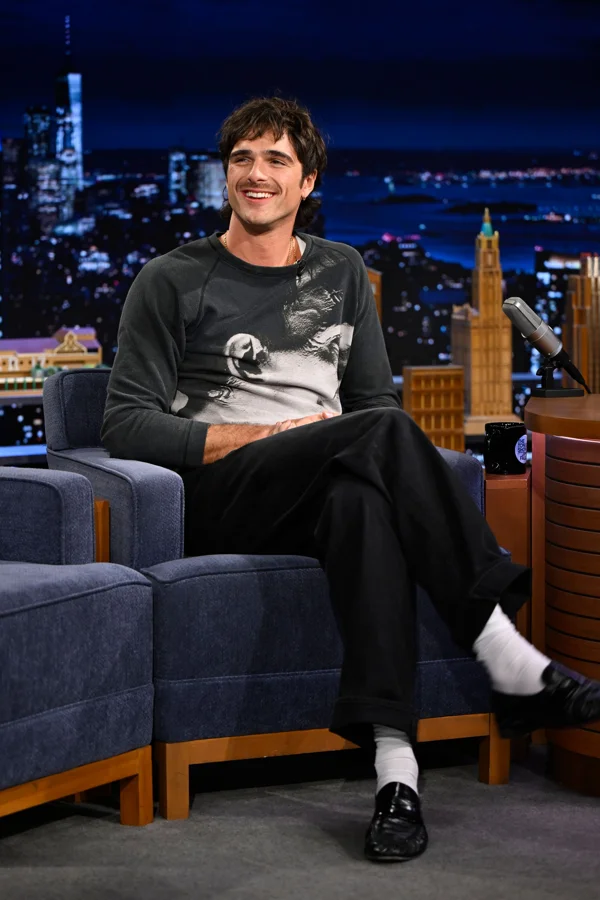Jacob Elordi is quickly gaining acclaim for his role as Frankenstein’s monster in Guillermo del Toro‘s upcoming film, a portrayal that diverges from previous adaptations by emphasizing the character’s humanity. This Jacob Elordi Frankenstein Role signals a significant turning point in Elordi’s acting career, showcasing a deeper, more empathetic interpretation of Mary Shelley’s iconic creation.
Jacob Elordi’s Performance Draws Early Oscar Attention for a Nuanced Monster
Although the awards season is still months away, Jacob Elordi’s work in Frankenstein is generating buzz as a potential contender for Best Supporting Actor. This role marks the most transformative in Elordi’s career so far, challenging the traditional depiction of the monster and appealing to the Academy’s appreciation for complex performances. Known primarily for characters like Nate Jacobs in the television series Euphoria and Felix Catton in the film Saltburn, Elordi delivers a stark departure from his usual charm and wit, inhabiting the monster with surprising ease and depth.
Guillermo del Toro’s adaptation remains largely faithful to Mary Shelley’s original novel but incorporates thoughtful alterations to highlight key themes. Central among these is the exploration of what it truly means to be alive, as Shelley draws intriguing parallels between creator Victor Frankenstein and his creation. Del Toro’s film intensifies this dynamic, hinging on Elordi’s ability to make the monster relatable beneath prosthetics and makeup.

Unlike many past adaptations that portray Frankenstein’s monster as a mere savage or an object of ridicule, Elordi breathes life into a character bursting with curiosity, emotion, and profound humanity. This reinvention invites viewers to reconsider their preconceived notions and recognize the creature’s tragic depth rather than dismissing him as a grotesque figure. Such a compelling humanization is rarely seen in previous depictions, making Elordi’s portrayal stand out.
Elordi’s career trajectory has steadily risen, with deliberate steps away from his teen drama beginnings toward more challenging roles in films like Priscilla and the series The Narrow Road to the Deep North. The Frankenstein role appears to solidify this evolution, and if the actor secures an Oscar nomination, it could elevate his status to a new echelon of Hollywood talent, rewarding his dedication to multifaceted storytelling.
The Controversy Surrounding Jacob Elordi’s Upcoming Role in Wuthering Heights
After Frankenstein, Jacob Elordi will reunite with director Emerald Fennell, known for Saltburn, in the forthcoming film adaptation of Emily Brontë’s Wuthering Heights. Scheduled for release in February 2026, this adaptation has quickly attracted criticism, particularly concerning its casting and interpretive choices. The role of Heathcliff, a central figure in the novel, is portrayed by Elordi despite debates about the character’s racial identity.
Though Brontë’s text leaves Heathcliff’s background ambiguous, many interpretations consider him a person of color, a factor deeply woven into his characterization. Casting Elordi, who is not a person of color, has spurred backlash relating not only to diversity but also to the nuanced cultural dimensions that Heathcliff’s race brings to the story. These concerns complicate expectations for the film and intensify scrutiny on Elordi’s performance.
Transitioning from the widely praised Frankenstein to a controversial role like Heathcliff poses risks for Elordi. While his ability to portray complex and isolated characters is evident—traits shared by both Frankenstein’s monster and Heathcliff—there is a chance that audiences may perceive his roles as too similar, potentially limiting his range. Heathcliff’s character is known for his brooding passion and societal alienation, resonating with the emotional depth Elordi demonstrated in Frankenstein.
This continuity in character type might satisfy some viewers, but it could also stall Elordi’s momentum as an actor seeking diverse and transformative parts. The challenge will be to maintain distinctiveness between these roles while navigating the controversies surrounding race and representation in the adaptation.
Exploring the Cast and Creative Teams Behind Both Films
In Frankenstein, Oscar Isaac stars as Dr. Victor Frankenstein, the scientist whose obsession leads to creating life in a groundbreaking but perilous experiment. Jacob Elordi stands out as the monster, a role that demands emotional vulnerability beneath layers of physical transformation. Guillermo del Toro directs and co-writes the film with Mary Shelley credited for the source material, and producer J. Miles Dale supports the project’s vision. The film, blending drama, horror, and science fiction, is set for release on October 17, 2025, with a runtime of 149 minutes.
Wuthering Heights features Margot Robbie as Catherine Earnshaw, with Elordi cast as Heathcliff, Hong Chau portraying Nelly Dean, and Alison Oliver as Isabella Linton. Emerald Fennell directs and writes the adaptation, with Margot Robbie producing. The film promises to explore the passionate yet turbulent relationship between Heathcliff and Catherine, set against Yorkshire’s evocative landscape. Its February 13, 2026 release date positions it as another major project in Elordi’s expanding portfolio, offering a dramatic and romantic narrative.
The Broader Implications for Jacob Elordi’s Career and Audience Reception
Jacob Elordi’s portrayal of Frankenstein’s monster by Guillermo del Toro redefines a character often misunderstood and miscast. By emphasizing the character’s internal turmoil and humanity, Elordi challenges viewers to empathize with the creation rather than merely fear it. This role not only elevates his status as an actor capable of profound depth but also ignites discussions about the nature of monstrosity and identity.
However, Elordi faces an uncertain path with his next project, Wuthering Heights, where the controversy surrounding Heathcliff’s racial identity could influence critical and audience reactions. The similarities between the emotional experiences of both characters raise questions about whether Elordi will be able to showcase his range or risk being typecast in roles defined by isolation and tragedy.
Looking ahead, these two films offer a significant test of Elordi’s versatility and capacity to navigate both acclaim and criticism. His choices in roles appear deliberate, aiming to shed his teenage drama image and establish himself as a vital figure in contemporary cinema. How audiences and critics receive these performances will likely shape the next phase of his career and his standing within Hollywood’s competitive landscape.
